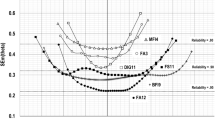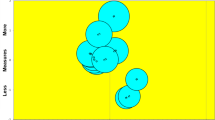Abstract
Purpose
Cancer-related fatigue (CRF) is one of the most common symptoms experienced by cancer patients (CPs). The Brief Fatigue Inventory (BFI) is a reliable instrument to assess CRF in CPs. The aim of this study was to evaluate the psychometric properties of the Italian version of the BFI (BFI-I).
Methods
The BFI-I was developed by using the forward–backward translation approach. The psychometric properties of the BFI-I were assessed in terms of acceptability, internal consistency, and validity. Outpatient CPs filled in BFI-I along with the Medical Outcome Study Quality of Life Short Form 36 (SF36). Demographic and health data were collected.
Results
The BFI-I had an overall Cronbach alpha for the nine items of 0.94. The inter-item mean correlation was 0.64, and coefficients ranged from 0.47 to 0.81 for the nine items. The results of the factor analysis suggested a 1-factor solution explaining 68 % of the variance, supporting the hypothesis of unidimensionality of the BFI-I. The BFI-I score was compared to SF36 subscales score to evaluate concurrent validity. An expected inverse correlation between the BFI-I and the vitality subscale of the SF36 was observed (r = −0.67, 95 % confidence interval −0.73 to −0.59). The correlation with the other subscales of the SF36 ranged between −0.56 and −0.13. Discriminant validity analysis showed the BFI-I mean score significantly increased with increasing Eastern Cooperative Oncology Group values (p < 0.001).
Conclusions
BFI-I is a clinical instrument with satisfactory psychometric properties to assess CRF in Italian CPs.
Similar content being viewed by others
References
National Comprehensive Cancer Network (NCCN) (2012) Clinical practice guidelines in oncology. Cancer-related fatigue. http://www.nccn.org/professionals/physician_gls/pdf/fatigue.pdf. Accessed 09 May 2012
Laird BJ, Scott AC, Colvin LA, McKeon AL, Murray GD, Fearon KC, Fallon MT (2011) Pain, depression, and fatigue as a symptom cluster in advanced cancer. J Pain Symptom Manage 42(1):1–11
Minton O, Stone P (2009) A systematic review of the scales used for the measurement of cancer-related fatigue (CRF). Ann Oncol 20(1):17–25
Hofman M, Ryan JL, Figueroa-Moseley CD, Jean-Pierre P, Morrow GR (2007) Cancer-related fatigue: the scale of the problem. Oncologist 12(Suppl 1):4–10
Singer S, Kuhnt S, Zwerenz R, Eckert K, Hofmeister D, Dietz A, Giesinger J, Hauss J, Papsdorf K, Briest S, Brown A (2011) Age and sex-standardised prevalence rates of fatigue in a large hospital-based sample of cancer patients. Br J Cancer 105(3):445–451
Wang XS (2008) Pathophysiology of cancer-related fatigue. Clin J Oncol Nurs 12(Suppl 5):11–20
Curt GA, Breitbart W, Cella D, Groopman JE, Horning SJ, Itri LM, Johnson DH, Miaskowski C, Scherr SL, Portenoy RK, Vogelzang NJ (2000) Impact of cancer-related fatigue on the lives of patients: new findings from the fatigue coalition. Oncologist 5(5):353–360
Potter J (2004) Fatigue experience in advanced cancer: a phenomenological approach. Int J Palliat Nurs 10(1):15–23
Barsevick A, Frost M, Zwinderman A, Hall P, Halyard M, GENEQOL Consortium (2010) I'm so tired: biological and genetic mechanisms of cancer-related fatigue. Qual Life Res 10:1419–1427
Radbruch L, Strasser F, Elsner F, Gonçalves JF, Løge J, Kaasa S, Nauck F, Stone P, Research Steering Committee of the European Association for Palliative Care (EAPC) (2008) Fatigue in palliative care patients—an EAPC approach. Palliat Med 22(1):13–32
Borneman T, Koczywas M, Sun VC, Piper BF, Uman G, Ferrell B (2010) Reducing patient barriers to pain and fatigue management. J Pain Symptom Manage 39(3):486–501
Borneman T, Piper BF, Sun VC, Koczywas M, Uman G, Ferrell B (2007) Implementing the fatigue guidelines at one NCCN member institution: process and outcomes. J Natl Compr Canc Netw 5(10):1092–1101
Mendoza TR, Wang XS, Cleeland CS, Morrissey M, Johnson BA, Wendt JK, Huber SL (1999) The rapid assessment of fatigue severity in cancer patients. Cancer 85(5):1186–1196
Yun YH, Wang XS, Lee JS, Roh JW, Lee CG, Lee WS, Lee KS, Bang SM, Mendoza TR, Cleeland CS (2005) Validation study of the Korean version of the brief fatigue inventory. J Pain Symptom Manage 29(2):165–172
Lin CC, Chang AP, Chen ML, Cleeland CS, Mendoza TR, Wang XS (2006) Validation of the Taiwanese version of the Brief Fatigue Inventory. J Pain Symptom Manage 32(1):52–59
Okuyama T, Wang XS, Akechi T, Mendoza TR, Hosaka T, Cleeland CS, Uchitomi Y (2003) Validation study of the Japanese version of the brief fatigue inventory. J Pain Symptom Manage 25(2):106–117
Mystakidou K, Tsilika E, Parpa E, Mendoza TR, Pistevou-Gombaki K, Vlahos L, Cleeland CS (2008) Psychometric properties of the brief fatigue inventory in Greek patients with advanced cancer. J Pain Symptom Manage 36(4):367–373
Radbruch L, Sabatowski R, Elsner F, Everts J, Mendoza T, Cleeland C (2003) Validation of the German version of the Brief Fatigue Inventory. J Pain Symptom Manage 25(5):449–458
Mendoza TR, Laudico AV, Wang XS, Guo H, Matsuda ML, Yosuico VD, Fragante EP, Cleeland CS (2010) Assessment of fatigue in cancer patients and community dwellers: validation study of the Filipino version of the Brief Fatigue Inventory. Oncology 79(1–2):112–117
Apolone G, Mosconi P (1998) The Italian SF-36 health survey: translation, validation and norming. J Clin Epidemiol 51(11):1025–1036
Oken MM, Creech RH, Tormey DC, Horton J, Davis TE, McFadden ET, Carbone PP (1982) Toxicity and response criteria of the eastern cooperative oncology group. Am J Clin Oncol 5(6):649–655
Dewolf L, Koller M, Velikova G, Johnson C, Scott N, Bottomley A, for EORTC Quality of life group: EORTC quality of life group translation procedure (2009) Third Editon Copyright EORTC Brussels. http://groups.eortc.be/qol/downloads/translation_manual_2009.pdf. Accessed 09 May 2012
Fitzpatrick R, Davey C, Buxton MJ, Jones DR (1998) Evaluating patient-based outcome measures for use in clinical trials. Health Technol Assess 2(14):1–74
Streiner DL, Norman GR (2008) Basic concepts. In: Streiner DL, Norman GR (eds) Health measurement scales, 4th edn. Oxford University Press, New York, pp 4–13
Seyidova-Khoshknabi D, Davis MP, Walsh D (2011) A systematic review of cancer-related fatigue measurement questionnaires. Am J Hosp Palliat Care 28(2):119–129
Borneman T, Koczywas M, Sun V, Piper BF, Smith-Idell C, Laroya B, Uman G, Ferrell B (2011) Effectiveness of a clinical intervention to eliminate barriers to pain and fatigue management in oncology. J Palliat Med 14(2):197–205
Conflict of interest
The authors have declared that no conflict of interest exists. The authors have full control of all primary data and agree to allow the Supportive Care in Cancer journal to review their data if requested.
Author information
Authors and Affiliations
Corresponding author
Rights and permissions
About this article
Cite this article
Catania, G., Bell, C., Ottonelli, S. et al. Cancer-related fatigue in Italian cancer patients: validation of the Italian version of the Brief Fatigue Inventory (BFI). Support Care Cancer 21, 413–419 (2013). https://doi.org/10.1007/s00520-012-1539-z
Received:
Accepted:
Published:
Issue Date:
DOI: https://doi.org/10.1007/s00520-012-1539-z




